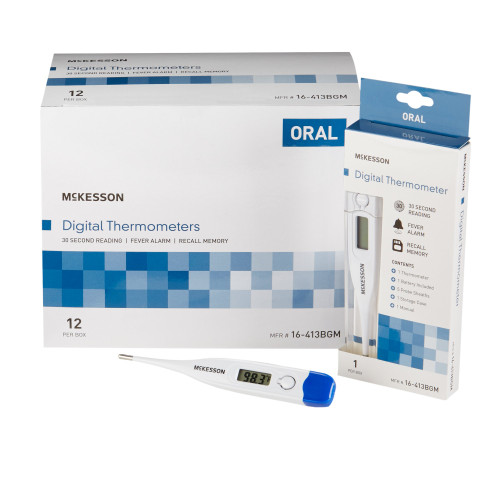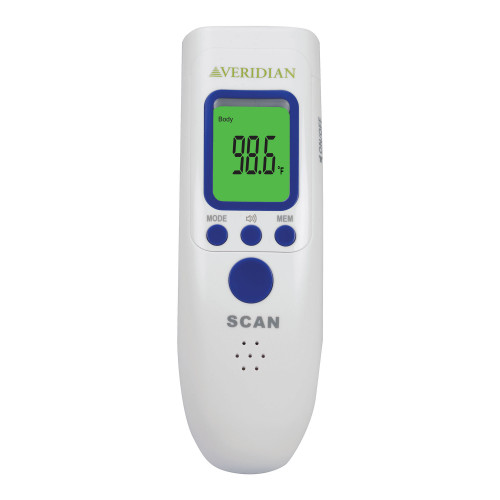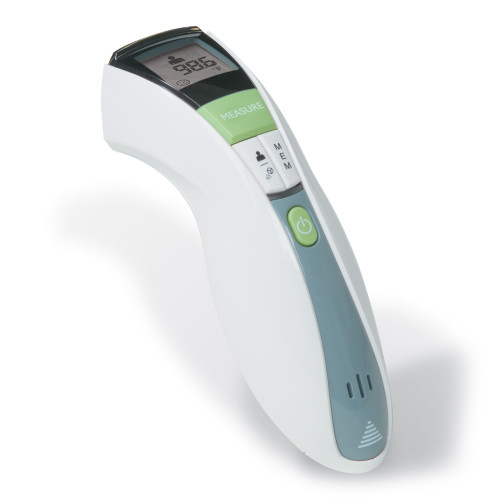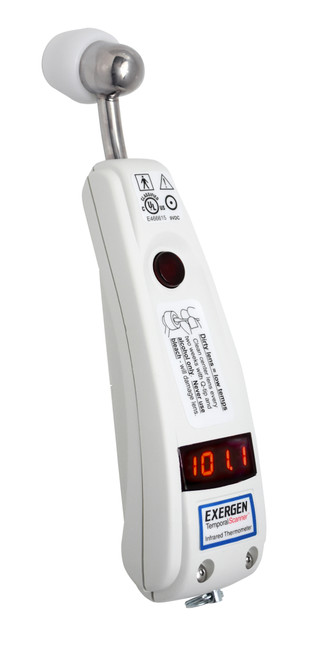-

Cypress
Cypress Oral & Rectal Digital Thermometer Stick 1 Seconds
The Cypress Digital Thermometer is versatile and can be used as an oral, ancillary, or rectal thermometer. This thermometer gives quick temperature readings that range from 90 to 108 degrees Fahrenheit. With two unit options available, the user can...
$7.58 -

McKesson
McKesson Oral Digital Thermometer Large Display
McKesson Digital Stick Oral Thermometer Includes thermometer with battery, storage case, 5 probe sheaths and instruction manual, Recall memory feature automatically stores last measured reading, allowing users to easily track temperature levels.Includes...
As low as $8.31 -

McKesson
McKesson Digital Thermometers - Oral, Handheld, Blue, 30 sec Response
Digital Sublingual Oral Thermometer is an accurate and inexpensive oral thermometer. It features a temperature range of 90 to 109.9 degrees F and 32 to 43 degrees C. Gives an accurate reading in just 60 seconds.Oral Color: Blue Water-Resistant Last...
As low as $7.84 -

ADC
Adtemp 427 Temporal Contact Thermometer 6 Second
AdTemp™ Temple Touch Thermometer provides a non-invasive forehead temperature measurement using patented conductive technology, delivering clinically accurate readings in about six seconds. The cost-effective design reduces the risk of cross...
$27.39 -

ADC
Adtemp 427 Digital Thermometer Stick 6 Second
This Adtemp™ 427 thermometer is an easy way to take the temperature of someone feeling unwell. It obtains a reading in as little as six seconds by simply touching the patient's forehead, making it excellent for use on sleeping babies and children. Since...
As low as $23.54 -

HealthSmart
HealthSmart Non-Contact Thermometer Seconds
The HealthSmart® Non-Contact Infrared Digital Thermometer is the ideal solution for reading temperatures with the least amount of physical contact. It provides clinically accurate readings in seconds. This instant digital forehead thermometer features...
$41.20 -

McKesson
McKesson Digital Refrigerator / Freezer Thermometer with Alarm
The versatile McKesson fridge/freezer dual channel thermometer records the date and time of the minimum and maximum readings, while independently monitoring user programmable high and low alarms. The unit incorporates an audible and visual LED...
$60.57 -

McKesson
McKesson Datalogging Refrigerator / Freezer Thermometer with Alarm
The McKesson data logger thermometer is designed to meet today's CDC and VFC requirements for vaccine storage and monitoring. It is a self-contained data logger that requires no PC software to generate a complete Excel .csv report. Monitor both the...
$223.79 -

Medsource IR300
Medsource IR300 Non-Contact Thermometer 2 Seconds
The MEDSOURCE Non-Contact Infared Thermometer is the ideal tool for safely screening temperatures. Measure body temperature on the forehead without coming into physical contact with another person. This thermometer is suitable for clinical and home...
$78.58 -

Veridian
Veridian Non-Contact Thermometer 1 Second
Non-contact measurements, proven clinically accurate 1-second instant results Body, surface or room measuring options Comparable to oral readings, silent reading night mode 3-Color backlit fever alert display Fahrenheit/Celsius measurements, Memory...
$34.77 -

Veridian
Veridian Infared Forehead Thermometer, Non-Contact Skin Probe
3-year limited warranty 2 AAA batteries included No tip covers required Non-invasive temperature reading of a person or object 1-second readout Proven clinically accurate Measures body and object/liquid temperatures Body temperature measurements taken...
As low as $38.98 -

Exergen
Exergen TemporalScanner - Digital Temporal Probe Thermometer
The Tat-5000 TemporalScanner™ Thermometer allows caregivers and health care professionals to easily take the temperature of patients or clients with ease. Use it to record core temperature by holding it on a patient's forehead near their temporal artery...
$521.98
Thermometers & Accessories

Thermometers & Accessories
A thermometer is an essential component of any first aid kit or medicine cabinet. Not so long ago, that meant buying a traditional glass thermometer or a simple digital oral thermometer. Today, however, there are many types of thermometers on the market, and choosing the best one for your needs may take a little research. Consider the different types of medical thermometers available and the pros and cons of each.
Glass Thermometers
Glass thermometers can take oral, axillary (under the arm), or rectal temperatures.
Pros: They’re versatile, they don’t need batteries or another power source, and they’re easily sanitized, so they don’t require any accessories.
Cons: They can break, and some glass thermometers may still contain mercury. They must remain in place for three minutes to obtain an accurate reading, and they’re more difficult to read than other types of thermometers.
Standard Digital Thermometers
Like traditional glass thermometers, standard digital thermometers can take oral, axillary, or rectal temperatures.
Pros: They’re versatile and give you a reading in about 30 seconds. They are more accurate than glass thermometers.
Cons: The battery can run down, and the electronics can malfunction. If you’re using them outside of a home setting, you will need to buy probe covers for sanitary reasons.
Ear (Tympanic) Thermometers
Ear thermometers use infrared technology to measure the body’s temperature at the eardrum.
Pros: This type of thermometer is less invasive than using a glass or digital thermometer to take an oral or rectal temp. Readings are nearly instantaneous. Because they are non-invasive, they’re well-suited for use in children.
Cons: They may be less accurate than temperatures taken orally or rectally. Using one requires purchasing thermometer accessories — in this case, probe covers to fit your specific model. The electronic parts can malfunction, as well.
Forehead (Temporal) Thermometers
Like ear thermometers, forehead thermometers use infrared technology to measure temperature, this time at the temple. Many models do not require contact with the skin to work.
Pros: Touch-free models don’t require any accessories and don’t have to be sanitized between uses. They are child-friendly and provide instant readings.
Cons: External factors such as ambient temperature, drafts, wind, and sunlight can affect the device's accuracy. Certain types of clothing can also cause inaccurate readings, as well.
Like other digital thermometers, they require electricity, and electronic parts can malfunction.
Non-Contact Thermometers
Non-contact thermometers use infrared skin probes to take a temperature without touching the skin. These non-touch thermometers provide instant and accurate temperatures in adults, children, and infants.
Thermometer Sheaths and Probe Cover
Thermometer probe covers are often a disposable cover that helps create a safe environment for taking temperatures. Using a thermometer sheath reduces the risk of contamination when sharing a single thermometer. These are helpful for use at home, healthcare facilities, and nursing homes.
Pacifier Thermometers
A fairly new arrival on the scene, pacifier thermometers are intended for infants or toddlers.
Pros: Easy to use in babies and toddlers.
Cons: They must stay in place for a very long time — up to six minutes — without moving. Readings are less accurate than other types of thermometers.
Disposable thermometer strips are also an option, but their accuracy is far lower than other thermometers. The Centre for Evidence-Based Medicine states that they should not be used to make clinical decisions.
A thermometer is a simple but important medical tool. Browse our popular brands including McKesson, AdTemp, and NexTemp to find the thermometer that’s right for you.
A thermometer is an essential component of any first aid kit or medicine cabinet. Not so long ago, that meant buying a traditional glass thermometer or a simple digital oral thermometer. Today, however, there are many types of thermometers on the market, and choosing the best one for your needs may take a little research. Consider the different types of medical thermometers available and the pros and cons of each.
Glass Thermometers
Glass thermometers can take oral, axillary (under the arm), or rectal temperatures.
Pros: They’re versatile, they don’t need batteries or another power source, and they’re easily sanitized, so they don’t require any accessories.
Cons: They can break, and some glass thermometers may still contain mercury. They must remain in place for three minutes to obtain an accurate reading, and they’re more difficult to read than other types of thermometers.
Standard Digital Thermometers
Like traditional glass thermometers, standard digital thermometers can take oral, axillary, or rectal temperatures.
Pros: They’re versatile and give you a reading in about 30 seconds. They are more accurate than glass thermometers.
Cons: The battery can run down, and the electronics can malfunction. If you’re using them outside of a home setting, you will need to buy probe covers for sanitary reasons.
Ear (Tympanic) Thermometers
Ear thermometers use infrared technology to measure the body’s temperature at the eardrum.
Pros: This type of thermometer is less invasive than using a glass or digital thermometer to take an oral or rectal temp. Readings are nearly instantaneous. Because they are non-invasive, they’re well-suited for use in children.
Cons: They may be less accurate than temperatures taken orally or rectally. Using one requires purchasing thermometer accessories — in this case, probe covers to fit your specific model. The electronic parts can malfunction, as well.
Forehead (Temporal) Thermometers
Like ear thermometers, forehead thermometers use infrared technology to measure temperature, this time at the temple. Many models do not require contact with the skin to work.
Pros: Touch-free models don’t require any accessories and don’t have to be sanitized between uses. They are child-friendly and provide instant readings.
Cons: External factors such as ambient temperature, drafts, wind, and sunlight can affect the device's accuracy. Certain types of clothing can also cause inaccurate readings, as well.
Like other digital thermometers, they require electricity, and electronic parts can malfunction.
Non-Contact Thermometers
Non-contact thermometers use infrared skin probes to take a temperature without touching the skin. These non-touch thermometers provide instant and accurate temperatures in adults, children, and infants.
Thermometer Sheaths and Probe Cover
Thermometer probe covers are often a disposable cover that helps create a safe environment for taking temperatures. Using a thermometer sheath reduces the risk of contamination when sharing a single thermometer. These are helpful for use at home, healthcare facilities, and nursing homes.
Pacifier Thermometers
A fairly new arrival on the scene, pacifier thermometers are intended for infants or toddlers.
Pros: Easy to use in babies and toddlers.
Cons: They must stay in place for a very long time — up to six minutes — without moving. Readings are less accurate than other types of thermometers.
Disposable thermometer strips are also an option, but their accuracy is far lower than other thermometers. The Centre for Evidence-Based Medicine states that they should not be used to make clinical decisions.
A thermometer is a simple but important medical tool. Browse our popular brands including McKesson, AdTemp, and NexTemp to find the thermometer that’s right for you.
